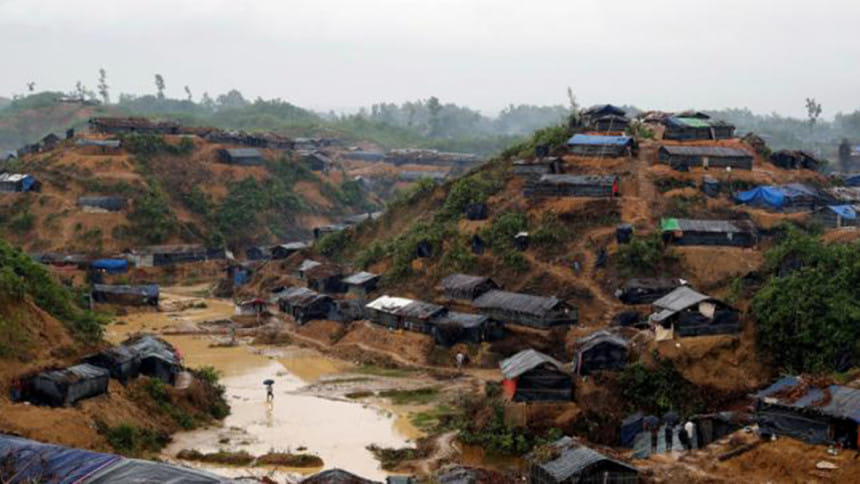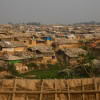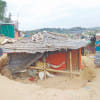Monsoon Threat: Amnesty calls for urgent aid for Rohingyas

Amnesty International has called on the international community to urgently step up international assistance for nearly a million Rohingya refugees in the camps in Cox's Bazar as they face the severity of this year's monsoon.
“The Rohingya refugees languishing in the overcrowded and threadbare camps in Cox's Bazar are in urgent need of international assistance,” said Biraj Patnaik, Amnesty International's South Asia director, in a statement on World Refugee Day yesterday.
“A mere fifth of the United Nation's appeal [$951 million] has been committed so far. The world cannot stand by while Bangladesh is left to shoulder the responsibility alone,” he said.
UN estimated that more than 200,000 Rohingya refugees are at risk of landslides and floods during the current monsoon season. Over the past five weeks, more than 28,000 people have been affected as 133 landslides have damaged more than 3,000 shelters.
Over 700,000 Rohingyas escaped the violent military crackdown against them in Myanmar's Rakhine state since August last year.
The Rohingya -- being both stateless and refugees -- are a unique population who are in critical need of international protection, said UN Refugee Agency on the occasion.
UN Secretary-General Antonio Guterres said in today's world, no community or country providing safe refuge to people fleeing war or persecution should be alone and unsupported.
“We stand together, or we fail,” he said, noting that more than 68 million people around the world are refugees or internally displaced as a result of conflict or persecution.
The Rohingya refugees, meanwhile, celebrated the day in Cox's Bazar through various activities including dramatic performances, photo and handicrafts exhibitions, music, rally, sports with support from the UN and other aid agencies.
CAMP CONDITIONS
Amnesty International said urgent assistance is needed to provide for the Rohingya refugees' most basic needs in the camps, including access to adequate housing, as almost all the shelters are currently composed of flimsy bamboo and tarpaulin.
While humanitarian workers have mounted operations to repair damaged settlements, the camps stretch over such an expanse that they cannot reach everyone.
“In almost all of the camps, there are no durable settlements, leaving them vulnerable to further weather events” AI said.
The United Nations' refugee agency has warned that “given the scope of the refugee population, the sheer size of the settlements and the challenging terrain, we fear that the extreme weather will cause further damage, destruction and potential loss of life.”
To avert further disaster, the refugees will have to be relocated to less congested areas on flat land -- something that will also mitigate security and medical risks, Amnesty International said.
LONG-TERM NEEDS
The global rights watchdog said the prospect of Rohingya refugees being able to return to Myanmar under dignified, safe and voluntary conditions in the near future remains remote. Until they do so, the refugee response needs to shift from a humanitarian approach to the one that meets the refugees' needs for protection.
It stressed on providing access to education for the Rohingya children and the right of adults to work and move beyond the camps.
“This is not a crisis that is going to disappear any time soon. We need to confront the fact that the Rohingyas may have to remain in Bangladesh for years to come.
The international community has a duty to support these victims of the most horrific human rights violations accordingly, and not wait until further disasters visit them before taking action,” said Biraj Patnaik.
Meanwhile, Asian Network on National Human Rights Institutions (ANNI) yesterday urged the National Human Rights Commission of Bangladesh to protect and promote the rights of the Rohingya.
Referring to a fact-finding mission in March, it said they found poor water supplies and water management systems, absence of gender-sensitive services for survivors of sexual violence and lack of education opportunities for refugee children.
According to a report launched by Plan International on World Refugee Day, adolescent Rohingya girls are being kept in stifling conditions in refugee camps in Bangladesh, unable to go out, deprived of education and facing prospects of early marriage whether they want it or not.
The report, Adolescent Girls in Crisis: Voices of the Rohingya is based on interviews with 300 refugee girls between 10 and 19 years old living in camps outside Cox's Bazar.
Plan found that once they arrived in a refugee shelter, girls were confined to tiny huts measuring just a few square feet, where temperatures soar close to 40° Celsius (104˚ Fahrenheit) each day, unable to go out because of restrictions placed on them by their families and for fear of violence.
"There is no doubt that adolescent Rohingya girls are one of the greatest victims in this humanitarian crisis," said Orla Murphy, Plan International's country director in Bangladesh in a press release.
"The cramped and overcrowded conditions -- not only in the camps, but also inside the tiny tents they now call home -- are having a devastating impact on their lives.
In a separate letter to the Myanmar Human Rights Commission, ANNI said Myanmar must assure the Rohingyas of citizenship with Rohingya identity as they want to return there as soon as possible. The letter also said Myanmar must guarantee freedom of movement, right to education and livelihood.
The repatriation deal also should be designed in close consultation with the Rohingyas, it said.
Australia, meanwhile, announced yesterday their additional humanitarian assistance of $18.4 million to meet the urgent needs of Rohingya refugees in Bangladesh. This brings Australia's total response to the crisis to $70 million since September 2017, according to a statement of Australian foreign ministry.

 For all latest news, follow The Daily Star's Google News channel.
For all latest news, follow The Daily Star's Google News channel. 







Comments